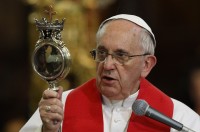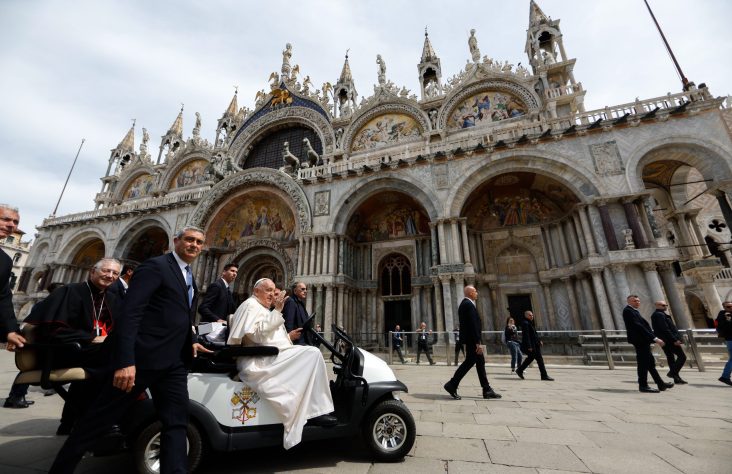March 23, 2015 // Uncategorized
Pope preaches hope to Naples' unemployed, immigrants, prisoners
By Cindy Wooden

Pope Francis holds a reliquary containing what is believed to be the blood of St. Januarius as he gives a blessing during a meeting with religious at the cathedral in Naples, Italy, March 21. The dried blood of the saint is said to liquefy several times a year. After the pope handled the relic, the blood apparently liquefied. (CNS photo/Paul Haring)
VATICAN CITY (CNS) — Hope is the first act of resistance to evil, Pope Francis told the people of Naples as he pleaded for respect for the dignity of immigrants, jobs for the unemployed and the conversion of the city’s notorious mafia families.
“The Gospel teaches that the truly blessed are the poor in spirit, the nonviolent, the meek, those who work for peace and justice. This is the force that will change the world,” the pope said March 21 as he celebrated Mass in Naples’ iconic Piazza del Plebiscito.
“Dear Neapolitans,” he said in his homily, “don’t let anyone steal your hope! Don’t give in to the lure of easy money or dishonest income. … React firmly against organizations that exploit and corrupt the young, the poor and the weak with the cynical sale of drugs and other crimes. Don’t let anyone steal your hope!”
Pope Francis’ 10-hour visit began with a brief stop for prayer at the Shrine of Our Lady of the Rosary in Pompeii and included a visit to a notoriously rough “periphery” neighborhood, Mass in the center of town, lunch at a local prison, a meeting with priests and religious, a visit with the sick and a seaside gathering with young people and the elderly.
As he was being driven along the waterfront at the end of the day, the crowd lining the road made way for a pizza maker. Although the popemobile did not stop, it slowed down enough for the flour-covered artisan to hand his pie to the pope. The Vatican did not release information on the pizza’s final fate.
During his morning meeting with residents of the city’s Scampia neighborhood, an area of poverty and degradation, an immigrant woman from the Philippines asked the pope to please remind people that immigrants are children of God.
“Have we reached the point where that’s necessary?” the pope asked the crowd. “Are migrants second-class humans?”
“They are like us, children of God,” he said. What is more, they are reminders that this world is not the permanent home of anyone and that “we are all migrants (moving) toward another homeland.”
“We are all children of God,” he said, “beloved children, desired children, saved children. Think about that!”
The pope also insisted, loudly and repeatedly, that high unemployment rates — especially among youths — were a detriment to society and a failure of the current economic system and public policies.
The problem is not simply the poverty joblessness creates, he said, but the way it robs people of dignity and of hope for the future. “When one is unable to earn his daily bread, he loses his dignity,” the pope said.
“Tell me,” the pope told the crowd in Scampia, “if we close the door on migrants, if we take away the jobs and dignity of people,” what will happen? Corruption “is a temptation, it’s a slide,” he said.
Everyone has within them the possibility of being corrupted, of paying someone under the table or looking for easy cash, he said.
“Corruption stinks” like a decaying animal corpse, he said. “A corrupt society stinks. A Christian who allows corruption is not a Christian. He stinks, understand?”
Later, addressing mafia members and other criminals during his homily at Mass, the pope said: “Humbly, as a brother, I repeat: Convert to love and justice. Let yourself be found by God’s mercy.”
“The tears of the mothers of Naples, mixed with those of Mary our heavenly mother,” also are pleading for the corrupt to change their ways, he said. “These tears can melt the hardness of your hearts and lead everyone back to the path of goodness.”
After Mass, Pope Francis went to a local prison, where he had lunch with about 100 prisoners, who had been chosen by lottery. They reportedly included 10 people from a prison block set aside for inmates who are homosexual, transgender or HIV-positive.
Although he had prepared a speech for the inmates and prison staff, the pope set it aside and spoke informally, telling the prisoners that everyone has made mistakes, but the important thing is to make amends, get up and try to live a better life.
The first saint in Christianity, he said, was a condemned thief — the one who was crucified alongside Jesus and asked him, “Remember me when you come into your kingdom.” Jesus’ response to him was, “Today you will be with me in Paradise.”
Ending the day with young people and the elderly, the pope admitted to being “really tired” by the day’s busy schedule.
He joked with a woman identified only as Erminia, who told him she was 95 years old.
“If you are 95, I’m Napoleon,” he told her.
Pope Francis denounced the “hidden euthanasia” of withholding medicine from the aged, “not giving them care, making their lives sad” and allowing them to die alone.
He told people with elderly parents to make an examination of conscience about how often they phone or visit their parents, and he told everyone to remember that when it comes to how they treat the aged, “you will reap what you sow!”
Angelo and Caterina Russo, who direct the Naples archdiocesan family life office, asked the pope’s advice for dealing with the current crisis in marriage and family life.
Pope Francis said, “I don’t have the recipe” for changing the situation, but he is convinced that October’s world Synod of Bishops on the family could be a start for the church. He also denounced “gender theory” for undermining marriage by creating confusion about what it means to be a man or woman.
Without a solid upbringing and education in the meaning of love, marriage and family life, he said, even the best marriage preparation courses cannot create a Catholic husband and wife. It is not “like a language course: You’ll be spouses in eight lessons,” he said.
And, as he frequently does, he told married couples it is natural to fight, even throw things, but it is important never to end the day angry.
“Plates can fly,” he said. “Have you broken a few,” he asked the Russos, who have been married 31 years.
“Plastic,” Angelo said before Caterina explained, “We used plastic plates at the beginning.”
Blood of Naples’ patron liquefies during pope’s visit to cathedral
By Cindy Wooden
VATICAN CITY (CNS) — At the end of Pope Francis’ spontaneity-filled meeting with priests, seminarians and religious in the cathedral of Naples, the vial of dried blood of the city’s patron saint appeared to miraculously liquefy.
After Pope Francis blessed the congregation with the reliquary holding the vial, Cardinal Crescenzio Sepe of Naples announced, “As a sign that St. Januarius loves the pope, who is Neapolitan like us, the blood is already half liquefied.”
The thousands of people present in the cathedral applauded, but the pope insisted on taking the microphone. “The bishop said the blood is half liquefied,” he said. “It means the saint loves us halfway; we must all convert a bit more, so that he would love us more.”
The blood of the fourth-century martyr is Naples’ most precious relic. The townspeople gauge the saints’ pleasure with them by awaiting the blood’s liquefaction three times a year: in the spring during celebrations of the feast of the transfer of the saint’s relics to Naples; Sept. 19, his feast day; and Dec. 16, the local feast commemorating the averting of a threatened eruption of Mount Vesuvius through the intervention of the saint.
When Pope Benedict XVI visited in 2007 and the blood did not liquefy, Msgr. Vincenzo de Gregorio, custodian of the relic, told reporters the miracle had never occurred when a pope visited on a day other than the feast day.
Entering the cathedral, Pope Francis’ white cassock and his arms were yanked repeatedly by priests, seminarians and nuns wanting to touch him or attract his attention.
Calmed reigned briefly after the pope reached the altar, but then Cardinal Sepe told the pope that, in accordance with canon law, he had given formal permission for the nuns in Naples’ seven cloistered convents to go out for the day.
The nuns, who had been seated in the sanctuary, broke free, running to the pope, surrounding him, hugging him, kissing his ring and piling gifts on his lap.
“Sisters, sisters, not now, later!” the cardinal shouted over the microphone to no avail. “Look what I have done,” he said, exasperated. “And these are the cloistered ones, imagine what the non-cloistered ones are like! Ay. They’re going to eat him alive.”
When order was restored, Pope Francis stood with several sheets of paper and told the congregation, “I prepared a speech, but speeches are boring.” So, he put the papers aside, sat down and began talking about how Jesus must be at the center of a consecrated person’s life, about life in community, about poverty and mercy.
“The center of your life must be Jesus,” he said. Too often, people — including priests and religious — have a difficulty with a superior or a confrere and that problem becomes the real center of their lives, robbing them and their witness of joy.
Addressing seminarians, he said, “if you do not have Jesus at the center, delay your ordination. If you are not sure Jesus is the center of your life, wait a while in order to be sure.”
Money definitely cannot be the center of the life of a priest or nun, he said. Even a diocesan priest, who does not take vows of poverty, must make sure “his heart is not there” in money.
The pope told the story of a religious woman he knew in Argentina who was so concerned about raising money for her school that she subconsciously preferred the company of people with money. One day, in the faculty room, she fainted. In the teachers’ attempt to revive her, the pope said, one suggested putting “a 100 peso note” under her nose to revive her, “but the poor woman was already dead and this was the last word said about her when no one knew if she had died or not.”
The best news. Delivered to your inbox.
Subscribe to our mailing list today.





